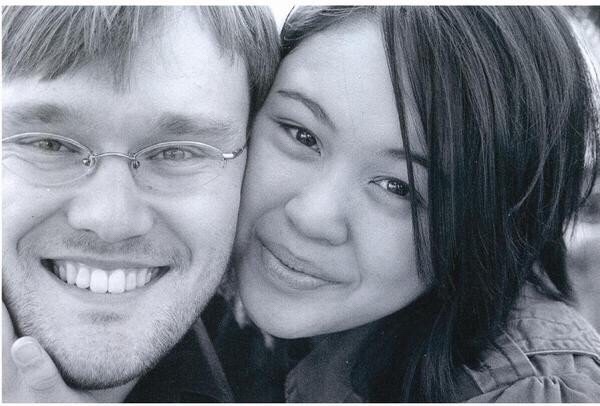
The day we got married fifteen years ago, we were babies. I was twenty-one; you were twenty-three. At the time, we thought we were so grown up, but now I see how naive we were. Our entire future lay before us: bright and overflowing with possibility. We were going to conquer the world! Not really, but it certainly felt like it.
We didn’t know that our first ministry position would be at a church plant that would fail before it fully launched, that in its final week you would become the lead pastor with the responsibility of shutting it down with dignity. You were amazing; I can’t remember if I ever told you. We didn’t know how bad the situation was until a veteran minister told us that what we went through was the worst he had ever seen. Surely not, we thought. But further corroboration came a decade later when we ran into several pastors who had seen what we went through and each told us the same thing: “We’re so happy you’re still following Jesus.”
When we were in the midst of that ministerial catastrophe, we felt like our lives were over. We had no idea our lives were just beginning.
We didn’t know that in less than a year, we would move to the Philippines and join the pastoral staff of the largest church in the country. (What a turnaround from what we had come from!) Our minds didn’t have the capacity to anticipate how much we would learn, how much we would heal, and how much we would fall in love with a people we never expected to fall in love with. When we eventually left the Philippines to follow the dream we had in our hearts since before we got married, we again felt like we could conquer the world.
We left the Philippines to move to Springfield, MO. Not really. We left the Philippines because we wanted to move to Japan to start a church, but we needed to prepare first. And God wanted us to prepare in Small City, USA. “Five years,” we said. “We’ll live in Springfield for five years and then we’ll move to Japan.” No we wouldn’t.
When we hit the two-and-a-half-year mark, we were halfway done with our gotta-do-before-we-go-to-Japan list. We were right on schedule. And then…
“Daniel, my hands hurt. Look, my fingers can barely move.” After getting a master’s degree in piano performance, we thought my hands were just tired. We had no idea our lives were about to get harder.
Months later you wouldn’t just be my husband; you would become my caretaker. Every morning, you would carry me out of bed and move my legs toward the bathroom because I wouldn’t be able to do it on my own. You would lift my hands over my head to help my arms move as I would scream and cry in pain. It was torture, but it had to be done. It was the only way I would be able to shower on my own. When you weren’t at work, you were spending all your time taking care of me. I could see the exhaustion and worry on your face. Before we went to bed each night, I would cry because I knew the next day we would have to do it all again.
All of this was during your first semester of seminary. When I was in grad school, you supported me. “When you start working on your master’s,” I said, I’m going to support you.” I’m so sorry I couldn’t keep my end of the deal.
When I was diagnosed with lupus, people told me, “Your husband is amazing because he stayed.” This isn’t what you signed up for the day you married me. And yet you stayed.
“But what about Japan?” people asked us, as though God was completely shocked by my lupus diagnosis and had no idea it was coming when He placed the dream for Japan on our hearts. We didn’t know that the first time we would have a chance to minister in Japan, lupus would be the key. I would share my story of God’s goodness amidst suffering. It was Christmastime, so you would talk about Narnia, the darkness of winter, and the coming of spring. And God would do amazing things. We had no idea we would have to wait so long for this dream, but God has been good enough to let us have a little taste.
The excitement of that trip was soon overshadowed by more pain. “This is harder than the failed church plant,” I cried, “This is harder than lupus!” You nodded. You felt it, too. Finding out we couldn’t have children was devastating for both of us.
The day we got married, if I would have known the kind of suffering we would experience, I don’t know that I could have gone through it. I would have looked at all the hard stuff and walked away. But if I had, I wouldn’t have known the profound joy that has blossomed out of each painful experience.
In the months that followed the failed church plant, we found another church in Washington, D.C. where we were surrounded by people who spoke life into our hearts. In that church, God taught us to stand up again. Whenever we go back to visit D.C., I love that we always make a stop at that church’s coffeehouse as a kind of pilgrimage. How fitting that it’s called Ebenezers: “Thus far the Lord has helped us.” And as you sip your coffee and I sip my iced chai, we remember that we’re standing on holy ground, a place where God met us. And when we look back on our lives and remember all we’ve been through, we’re filled with fresh excitement for our future. God brought us this far; He’s not about to stop helping us now!
I’ve heard people say that you don’t really know what love is until you have children. But when you carried me—literally—each morning as we thought I might be dying, you showed me what love is. You showed me a capacity for love beyond what I could imagine. And as we have walked through the deep waters of chronic illness together, you have been my advocate and my champion. When I began to walk on my own again, you cheered for me and made me feel like I had conquered the world. I can’t articulate well the gratitude I feel knowing that I have such an amazing person to celebrate every victory with.
And as we walked through the wilderness of infertility, you refused to let me stop dreaming. I love what we’re doing with our lives now. We’re doing things we probably wouldn’t be able to do well if we had children. We wanted so much to be able to leave behind a legacy. We thought we needed children to do that; God showed us we don’t.
And the cherry on top: you’ve shown me how fun it can be when it’s just the two of us. Five Bookstore Friday dates, late night Waffle House runs, and spontaneous “Ooooh, what’s that? Let’s check it out!” adventures.
When we were young, we wanted so much for God to show us His plan for our lives. We know better now. We don’t really want to see all the stuff that God sees because it would terrify us. We would run the other direction and miss all the good stuff He has for us.
I don’t want to know what’s going to happen next. I just want to keep living this adventure with you.




